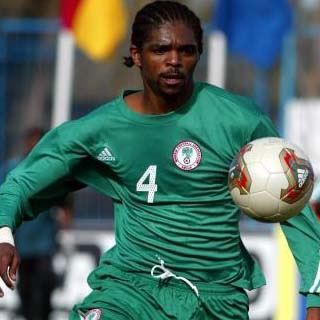Remembering Nwankwo Kanu
Nwankwo Kanu, OON (born 1 August 1976), or simply Kanu, is a retired Nigerian footballer who played as a striker. He was a member of and later captained the Nigerian national team for 16 years from 1994 until 2010. Kanu is a member of the Igbo ethnic group; his name, Nwankwo, means Child born on Nkwo market day in the Igbo language.
Kanu has won a UEFA Champions League medal, a UEFA Cup medal, three FA Cup Winners Medals and two African Player of the Year awards amongst others. He is also one of few players to have won the Premier League, FA Cup, Champions League, UEFA Cup and an Olympic Gold Medal. He made the third-most substitute appearances in Premier League history, appearing from the bench 118 times. He is also a UNICEF ambassador.

Born in Owerri, Nigeria, Kanu began his career at Nigerian league club Federation Works, before moving to Iwuanyanwu Nationale. After a notable performance at the U-17 World Championships he was signed by Dutch Eredivisie AFC Ajax in 1993 for €207,047. He made his Ajax debut the following year and went on to score 25 goals in 54 appearances. Kanu also came on as a sub in Ajax's 1995 Champions League final win over AC Milan. In 1996, Ajax sold Kanu to Serie A side Internazionale for around $4.7 million. That summer he captained the Nigerian team that won gold at the Olympics, and scored two late goals in the semi-finals against powerhouses Brazil to overturn a 2–3 scoreline into a 4–3 win in extra time. Kanu was also named African Footballer of the Year for that year. However, soon after returning from the Olympics, Kanu underwent a medical examination at Inter, which revealed a serious heart defect; he underwent surgery in November 1996 to replace an aortic valve and did not return to his club until April 1997. In interviews, Kanu frequently cites his faith as a Christian, and has often mentioned this trying time of his career as an occasion when he prayed to God. Kanu's experience also led to his founding the Kanu Heart Foundation, an organisation that helps predominantly young African children who suffer heart defects and whose work was expanded to provide aid for homeless children in 2008.
Arsenal
In February 1999, after just twelve games and one goal for Inter, Kanu was signed by Arsenal for approximately £4.15 million. He made his debut for Arsenal, against Sheffield United in the FA Cup. With the score 1–1 and ten minutes to go, the Sheffield United goalkeeper Alan Kelly kicked the ball out of touch so that treatment could be given to Lee Morris. When the ball was thrown back into play by Ray Parlour, although it was intended for Kelly, Kanu chased the throw-in down the right wing unchallenged and centered the ball for Marc Overmars, who scored to make the match 2–1. After the match, Arsenal manager Arsène Wenger accepted that it was not right sport-wise and offered to replay the match[10] which was again won by Arsenal.

Kanu is a member of the "Invincibles"; the Arsenal team that finished a season of the Barclays Premier League unbeaten in the season of 2003/04, along with other famous players like Thierry Henry and Robert Pires.
International career
Kanu was a member of the Nigerian national team from 1994 to 2010, making his debut in friendly against Sweden. Earlier on at the start of his career, Kanu was instrumental in Nigeria's overall success at the 1993 FIFA U-17 tournament in Japan and their subsequent 2–1 victory over Ghana in the final. With five goals, he was second joint-scorer in the tournament with Peter Anosike and Manuel Neira, behind compatriot and Captain Wilson Oruma.

As well as winning the Olympic gold in the football event at 1996 Olympics in Atlanta, where he scored the winning goal in the 4-3 semi-final win over Brazil, Kanu participated in the 1998 and 2002 FIFA World Cups. On 24 June 2010, Kanu ended his international career following Nigeria's exit from the 2010 World Cup in South Africa. Nigeria lost their group matches against Argentina and Greece, before a 2–2 draw with South Korea ended their stay in the tournament. He won 86 caps and scored 13 goals for his country and was the joint most capped Nigerian player of all-time alongside Muda Lawal, until Joseph Yobo surpassed both players in 2012, winning his 87th cap.

